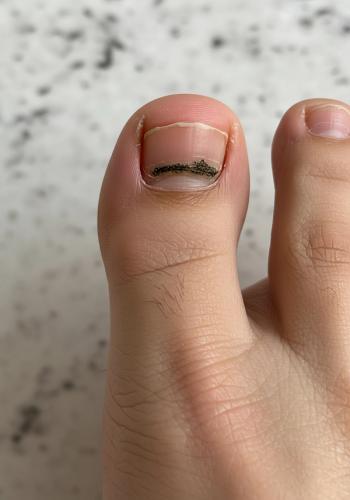
Positive Results for Libtayo as Adjuvant Treatment for Squamous Cell Carcinoma of the Skin | ASCO 2025
Researchers are also investigating the PD-1 immune checkpoint inhibitor as treatment before surgical and radiation treatment.
Libtayo (cemiplimab), approved as treatment for advanced cases of squamous cell carcinoma of the skin, might soon have a role in the treatment of local cases of the disease.
Results of a phase 3 trial reported today at the American Society of Clinical Oncology meeting showed a significant benefit from Libtayo when it was given to patients with localized squamous cell carcinoma after the cancer had been treated with surgery and radiation. In addition to this “adjuvant” use of Libtayo, other research has suggested that the cancer drug may benefit patients as a “neoadjuvant” treatment that is given before surgery and radiation.
The findings presented today were limited to patients with local squamous cell carcinoma that had characteristics that suggest a higher-than-normal risk of recurrence. A spokesperson for Regeneron, the maker of Libtayo, said that approximately 1% to 5% of patients with local squamous cell carcinoma would fall into the category of having a high risk of recurrence.
Even so, were the FDA to approve Libtayo as an adjuvant therapy, it would open the door to far greater use of the drug. Squamous cell carcinoma of the skin, also known as cutaneous squamous cell carcinoma, is the second most common form of skin cancer after basal cell carcinoma. The
In an interview earlier this week, Israel Lowy, M.D., Ph.D., clinical development unit head, oncology, at Regeneron, said the company has already filed applications with the FDA and the European Medicines Agency to have Libtayo approved as an adjuvant treatment for local squamous cell carcinoma of the skin. Lowy said that if the FDA were to give the application priority review status, which hinges on whether the agency deems the approval as meeting an unmet medical need, the approval could occur this year. A standard review would likely push the approval decision till 2026, he said.
The results reported today by lead investigator Danny Rischin, M.D., of the Peter MacCallum Cancer Centre in Melbourne, Australia, and his colleagues were simultaneously published in the New England Journal of Medicine (NEJM). The results showed that Libtayo reduced the risk of squamous cell carcinoma recurrence or death by 68% compared with placebo over a 24-month period. Among the 209 patients randomly assigned to be treated with Libtayo, the researchers tabulated 24 “events” — 18 patients had disease recurrence and six died without disease recurrence. That works out to a disease-free survival rate of 87.1%. There were 65 events among the 206 study participants randomly assigned to placebo — 61 patients had a recurrence of squamous cell carcinoma and four died without disease recurrence, according to the results reported in NEJM. That works to disease-free survival of 64.1%.
Lowy described the results as a “resounding finding” that using Libtayo after surgery and radiation benefits squamous cell carcinoma patients. “We very excited about that. We think it’s a great advance for patients.”
Disease-free survival was the primary end point of the trial, but the results reported by Rischin and his colleagues also showed that better outcomes occurred with Libtayo than with placebo when it came to secondary end points, such as local and regional recurrence (9 events vs. 40 events ) and distant recurrence (10 events vs. 26 events). In NEJM, Rischin and his colleagues noted that locoregional recurrences are “important medical events” for patients because they are associated with higher risk of disease and death.
Side effects were more common among those randomly assigned to be treated with Libtayo, with the exception of diarrhea. The most common side effects were fatigue, which was experienced by 22% of those in the Libtayo group, pruritus and rash. Approximately 1 in 10 (9.8%) of the patients in the Libtayo group discontinued treatment because of side effects compared with 1.5% in the placebo group. According to the results reported in NEJM, one death due to myositis was considered related to Libtayo by an investigator.
Lowy said the discontinuation rate wasn’t any different than what is normally seen. He added further data analysis may show that some patients may benefit from Libtayo even if they discontinue taking the drug later on.
Positive results of a single-arm phase 2 trial of Libtayo as a neoadjuvant treatment were presented at the European Society of Medical Oncology Congress in October 2023 and simultaneously in The Lancet Oncology. Those reports were preceded by positive results presented at the same meeting in 2022 and published simultaneously in NEJM. Lead investigator Neil D. Gross, M.D., of the University of Texas MD Anderson Cancer Center and his colleagues, which included Rischin, reported in NEJM that 40 of the 79 patients enrolled in the trial had a pathological complete response to the neoadjuvant treatment.
In the interview earlier this week, Lowy said Regeneron was working a global cooperative group on conducting a formal neoadjuvant study of Libtayo in all patients with squamous cell carcinoma who are eligible for significant surgery.
“We’ve been the innovator in this area,” said Lowy. He noted the phase 2 data for its use as neoadjuvant treatment and what he described as “practice-changing, phase 3 results for Libtayo as adjuvant treatment for people with squamous cell carcinoma with high-risk features. He said the company is also involved in research that involves injecting small doses of Libtayo into squamous cell carcinoma lesions, that may mean some people can avoid surgery.
Libtayo targets the PD-1 immune checkpoint inhibitor receptor on T cells. Doing so enables T cells to recognize cancer cells and attack them. “We want to be the anti-PD1 of choice for patients with CSCC” said Lowy, using the initialism for cutaneous squamous cell carcinoma.
Newsletter
Get the latest industry news, event updates, and more from Managed healthcare Executive.























